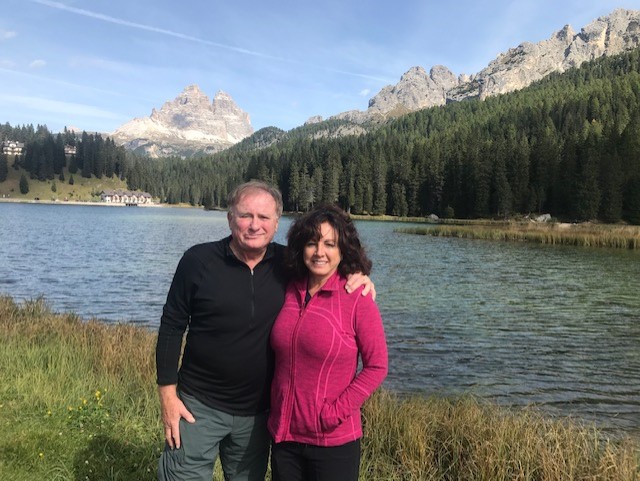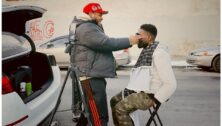Chester County Leadership: Glenda & Joseph (Skip) Brion

Joseph (Skip) Brion, the Chairman of Buckley Brion McGuire & Morris LLP and the former Chairman of the Chester County Republican Committee, and his wife Glenda, Executive Director of Community Warehouse Project, spoke with VISTA Today about their upbringings, the lessons they learned from their earliest jobs, what drew them to careers in law, and of course, the story of how they met.
While Glenda spoke about Community Warehouse Project, her nonprofit that donates new and used furniture to families and veterans in need, Skip discussed his entry into local politics, what differentiates him from other lawyers, what he’s focused on in his professional practice, and why he’s so passionate about Coatesville’s future.
Glenda and Skip, when were you born and where did you grow up?
Glenda: I was born in West Chester at Chester County Hospital, and I grew up on a dairy farm in Oxford. My parents divorced when I was ten, so my mom and I moved to West Grove and I went to Avon Grove High School.
Skip: I was born an only child in Philadelphia at Nazareth Hospital in Northeast Philadelphia in 1948. I grew up in Somerton and then Bustleton-Mayfair area.
What memories do you have of growing up?
Glenda: Having open fields around us was very special. I remember swimming in the swimming hole by ourselves without our parents ever worrying where we were. You had to climb under a barbed wire fence to go down the trail to the hole.
The downside was that as you get older, it’s a long way from everything! When I moved to the “big” city of West Chester when I was eighteen, I was happy to be around all the activities available in a town like West Chester.
Skip: I was a typical Catholic Boy. I went to Father Judge, served as an altar boy, and played sports. We all played handball, wireball, halfball and hoseball in the alleys in Mayfair.
Were you good at sports, Skip?
I was a decent basketball player. I played guard and had a nice jump shot. I enjoyed basketball after school almost every day. There was a thought that I was fast enough to play football, but when I broke my collarbone in a scrimmage, I proved too fragile. I took up tennis later in life and very much enjoy playing.
What did your parents do, Skip?
I never knew my father that well. He was wounded in Iwo Jima, but like so many World War II veterans, he never talked much about it.
My parents divorced around 1955. After that happened, I did not see my father much and was raised by two strong women – my mom and her significant other, Alfie.
My mother was a secretary, a typical working woman in the 1950s. When she went to work, I went to school. I was an early latch-key kid! Her instructions were come home from school, get in before dark, get some dinner for myself, and don’t get into trouble.
What was your first job, Glenda?
When I was sixteen, I got a part-time job after school in a small law office in West Grove. The lawyer I worked for needed extra help at the desk for document work, answering phones, and other paperwork. I realized immediately I was fascinated by the law.
What drew you to law, Glenda?
I liked the structure of law as well as the endless amount of knowledge to be gained. Every situation, case, and legal challenge is different. I found that intriguing as it was a world I had never been exposed to. I was happy to use my skills that I learned in high school in a law firm.
Skip, what was your first job?
My mother’s brother was a developer in Philly, who built a lot of apartment buildings in the Northeast. He gave me my first job as a painter when I was twelve. I would ride my bike over to one of his apartment projects every day and paint the walls, ceiling, and doors, everything in the apartment, white. I made fifty cents an hour and thought that was great.
What lessons did you take from those early jobs, Skip, that stay with you today?
I learned if I worked hard, I could achieve an element of success. Whether it was money or accomplishment, I gained something. I also became somewhat of a perfectionist.
I spent a lot of time with my grandparents. My grandfather instilled a strong work ethic in me. I grew up with my grandparents after eighth grade, going over for dinner a lot. I helped my grandmother in the garden, probably how I found my love of plants. My grandfather always took me places in Philadelphia: The Thanksgiving Day parade, Mummers parade, circus, Horn and Hardart Automat. We took the subway to Center City lots. Together, my grandparents taught me to do the right thing and work hard.
Skip, where does your competitive nature come from?
My mother was an assertive, tough woman. She had a personality where no matter what I did, she always let me know I could have done better. If I got an A, she would ask why I didn’t get an A+. She was always pushing and encouraging me to do better.
Glenda, where did you go to college?
After high school, I moved to West Chester. I got a job in the Prothonotary’s office in the Chester County Courthouse. My part-time job at the law firm was very helpful in obtaining the skills needed to work in the Prothonotary’s office.
By then, my mom had passed away, and I was on my own. I needed to take a job that was paying more money. Legal Aid of Chester County offered me a job.
It was a wonderful next step for me to use the legal skills that I was learning along the way. Then I decided to go to paralegal school at Widener University and attended classes at Immaculata.
How about you, Skip?
I went to St. Joe’s University. I really liked Jack Ramsey and their basketball team – and the Hawks were always in the Top Ten back then. It was exciting to go to the Palestra to watch a Big-5 basketball game. I also loved the Jesuits and wanted to be taught by them.
What was it about the Jesuits that drew you in?
The Jesuits always analyzed and questioned. They left it up to you to read the Bible but taught that the message is not just literal it is philosophical. They allowed me to use my own thoughts and challenged my mind through metaphysics, philosophy, and the Greek philosophers, as well.
In hindsight, was attending St. Joe’s a good decision?
St. Joe’s taught me two things. First, as I mentioned, it made me think about everything from many angles. Answers were not just black and white – you were never right or wrong. Different point of view were good. They created debate which caused better understanding of our society. It taught me that compromise is good.
What made you decide to become a lawyer?
I had a couple job offers when I graduated. I worked at a packing company in college who offered me a job in sales to work in Odessa, Texas. I know I did not want to do that.
At St. Joe’s there was an Economics professor there named John Kenney, who also had a law practice in Media. He was very influential in my decision to go to law school.
I met Mr. Kenney at a time when I didn’t have many male figures in my life. He thought I would make an excellent attorney. He helped guide me through the process, and I enrolled at Villanova Law School over others.
Who were the people, Skip who helped you along the way aside from Mr. Kenney?
After I graduated from Villanova, I was working at Legal Aid in Chester. One day at Villanova, someone posted a job on the employment bulletin board, that just read, “Law Clerk Wanted in Downingtown.” I had never been west of Villanova. I asked a friend how to get to Downingtown, and he told me, “get on Route 30 and keep going, you can’t miss it.” So, that was my introduction to Chester County. I got a job in Downingtown.
What did they see in you, Skip?
First, I think they saw cheap labor. I was a second-year law student, not making any money at Legal Aid, and was eager to please, plus I wanted to learn
Glenda, who were the people who helped you get where you are today?
My sister had a major impact on my life. She was a wonderful big sister who had to take on a motherly role with me early on with our mom passing away so young.
Another person is Betty Bell in the Prothonotary’s office, who took a real chance on me. I was a country girl who didn’t know much, but she helped me learn and grow in the role.
Along the way, there have been so many people. We are such a community here in West Chester. It’s been a team effort. I have been drawn to nonprofit work for a long time, especially where I can do things in the community that helps everywhere. Everyone.
Glenda, how did you and Skip meet?
I worked at Legal Aid of Chester County. Skip served on the Board of Legal Aid.
Was it love at first sight, Glenda?
It was not love at first sight! We were friends first and then it was love. Skip was very thoughtful – in a logical, analytical way – and smart as well. I was very impressed. He was always funny too, which I was very attracted to.
We also shared a love of music. Then he showed me the “big city” of Philadelphia! It was 1976, it was the bicentennial year, and Philadelphia was booming with special events.
Glenda, what kind of music were you both listening to back then?
We both had our favorites but were open to one another’s taste. We both loved Cat Stevens, Paul McCartney, David Bowie, and Billy Joel and Neil Diamond. I had seen Billy Joel at West Chester University one year, which is crazy to think about that. I dragged him to a Doobie Brothers concert, which he wasn’t too sure about.
Skip, as a young law student from the Northeast, how did you make a name for yourself in Chester County?
As I said, I began working in a firm in Downingtown. The President of Brandywine Savings and Loan, John Rodgers, took a liking to Glenda and I.
Bob West at Manito Title noticed us and I began representing the banks and Manito. Next thing I know, my practice grew.
People who were influential, Larry Ginter, Bernie Hankin, Bill Lamb, and Ray Carr to name a few heard of me and my practice grew.
Initially, I was representing banks and businesses but as time went on, my practice grew to include developers and townships as well.
How did you get involved in local politics, Skip?
I ran for West Chester Borough Council in 1977 and won the Primary but decided not to run in the General election. Instead, I told Michelle Deary, who was running for District Judge, that I would run her campaign. She ended up losing, but from that point on, I knew I wanted to be involved in politics.
Did you ever run for office again?
Despite being asked many times, I never got the bug to run myself. I liked being the person who thought through the nuts and bolts of the election rather than being the actual candidate.
Skip, what makes you different as a lawyer from someone else?
I don’t know if it’s unique to me, but I think what I try to do is bring the law and common sense to each case. I always try to get the job done without costing my client a lot of legal fees. I always try to work out an accommodation, so each case doesn’t always end up in court or the filing of a lawsuit. I have a theory in life; if you walk away from a settlement table, and everyone compromised, everyone seemed satisfied.
I also know the law, but at the same time, I care about what the developer wants to do with the land. I needed to be comfortable with the development. I couldn’t represent an application to build homes without some consideration of the land. In my position as Chair of the Chester County Republican Party, I believed in the preservation of open space. It was an important issue in Chester County.
I grew up in a neighborhood with rowhomes, alleys and subways and then married a woman who grew up on a farm in Oxford. I knew some development was good for Chester County, but I always kept in mind the fact that open space was an important aspect of Chester County’s quality of life. I did not like large subdivision of houses that tore apart farms -so I gravitated to commercial uses along the major highways.
Looking into 2020, Skip, what are you focused on in your professional practice or in the community?
Professionally, at seventy-one of age, at Buckley Brion, I get to choose what I want to work on. Our firm is a full-service firm. However, I am able to work with the clients I enjoy and matters which interest me.
In the community, I want Chester County to stay as the number one county in Pennsylvania and the 23rd best county in the Nation. I’m not concerned about what party is in power. I think the Republicans did a great job running the County for the many years I was involved. The Democrats are in charge now and have a responsibility to maintain that standing. We, as good citizens should make sure that happens and help.
There are also areas in the County that need focus. One of my endeavors over the last few years (now that I am out of politics) as a member of the SEPTA Board is the completion and opening of the Coatesville train station. I also have assisted businesses and restaurants who want to open in Coatesville. It can be a vibrant city and should not be forgotten. With its history, Coatesville could be a great asset to the County and we will be a better County when that happens
Glenda, what lead to the creation of Community Warehouse Project?
I had worked at Friends Association, which is a homeless shelter for families. During my time there, I learned what a need there was for furniture. I used my development contacts for furniture donations. There was a whole population coming out of homelessness and getting housing but they did not have any furniture.
I retired from Friends and knew of a woman who had formed Community Warehouse as a 501c3 but had not started the program. I asked her if she would share it with me so I could get it up and running. I began the process of forming a Board, creating a web site, deciding on the procedures, etc. Thankfully, Eli Kahn agreed to provide free warehouse space for the furniture which allowed us to become operational.
What does Community Warehouse Project do?
We take pre-approved donated furniture, anything from beds, sofas, dressers, kitchen tables, chairs, and other basics needed to start an apartment or a house assuming you had nothing before. We then donate them to families and veterans in need. The clients must be referred to us by a service agency in Chester County. We have worked with forty different service agencies in Chester County.
Looking into 2020, what are the opportunities and challenges Community Warehouse Project is facing?
Our biggest challenges are transportation and beds. I have to raise extra money for beds all the time.
Why are beds so challenging?
Everyone needs them! We buy a lot of twin beds because many of our clients are families in small apartments. We give away about ten to fifteen beds each week.
I use our cash donations to purchase beds and to transport the furniture. A lot of families have a hard time getting the furniture to their new homes because they might not own a car or have a vehicle big enough to transport furniture.
How do you transport the beds?
We use rented trucks some of the time, but I’ve also been very blessed to have the help of A Marinelli & Sons who loan me two of their guys every other week for a day. They pick up and deliver. We try and get the service agencies to help with transportation as much as possible. Some can help and others just don’t have it in their budgets. I want to thank those who provide us cash donations to assist in the delivery of furniture. I also want to thank some awesome volunteers who help with the deliveries.
Is Community Warehouse Project looking to expand?
We would like to serve more people. We have served about 250 families this year up from the 150 or so we served in 2018.
We also work a lot with the VA Hospital in Coatesville. The veterans coming out of the VA Housing program been thrilled to get furniture to furnish their new home.
Is anyone else doing this in Chester County?
Some small organizations and a couple churches. I cannot oversell how important the Warehouse is. If you don’t have the space to store it, where can you put it until it’s needed? We have warehouses in Downingtown and West Chester right now because of Eli Kahn. We had so much stuff being donated that we couldn’t house it all in one place!
If people have furniture to donate, how can they get ahold of you?
They can go to our website www.communitywarehouseproject.com . This site has all the information a person will need to help our mission.
Skip, why are you so passionate about Coatesville’s future?
I think growing up in Philadelphia has influenced that. You understood growing up that there were areas of Philadelphia that you couldn’t go. I think Coatesville is treated like that right now. The people living there do not have the same benefits as other people in Chester County. We need to give them economic mobility. There are a lot of jobs in this county that are available if they had transportation to those jobs.
Look at Glenda. For years she worked at the Friends Association placing families in homes. She then realized that you could find them shelter, but they have no furniture or a bed to sleep on. Now they do thanks to the Community Warehouse Project. I am proud of all that she does.
Now what? The families need a job. They don’t have the money for a car. Bringing the train station to Coatesville will be life-changing for many people. That’s the next thing to make Coatesville viable. Restaurants, hotels, and more will hire those workers who can now get to the Downingtown, Thorndale, and Exton Train Station. I think that’s the next step that this county needs to address.
Skip, how has the practice of law changed over your lifetime?
The new way of communicating – technology wise – has changed everything. We don’t buy books anymore. We don’t go to the law library at the Bar Association. Your secretary used to type up your documents, send it and week later get an answer. Now, computers and the internet do it all.
Today, everything is so fast. Often times, you need to get back to someone within the hour!
Finally, Skip and Glenda what is the best piece of advice you’ve ever received?
Glenda: My sister, Pat, always taught me to have a sense of humor. I had a tendency in my younger years to take everything far too seriously. My sister would always remind me that it makes life more fun if you can just have a little twinkle in your eye.
Skip: My mentors always told me to always do the right thing. Don’t do the politically correct thing or what you think other people want you to do. Ask others for their opinion but do what you believe is right and stand by it. I’ve always tried to do that. Sometimes it was easier than other times.
________
Publisher’s note: Laura Wagoner contributed to this profile.
Connect With Your Community
Subscribe to stay informed!
"*" indicates required fields





![95000-1023_ACJ_BannerAd[1]](https://vista.today/wp-content/uploads/2023/03/95000-1023_ACJ_BannerAd1.jpg)










































